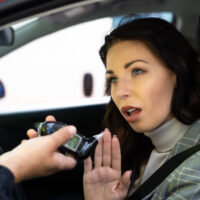What Happens If I Say No To A Breath Test?

If you are pulled over by law enforcement officers and suspected of driving under the influence (DUI) or driving while impaired (DWI), the police may request a breathalyzer to analyze your blood alcohol concentration (BAC). The BAC limit for adults is 0.08%, and if a driver’s BAC exceeds this limit, they may face charges. It is important to know that refusing a breathalyzer test in Maryland triggers specific penalties.
Because the state of Maryland has stringent laws in place to address drunk driving offenses, talking to a skilled Baltimore DUI & DWI lawyer as soon as possible following an arrest is advised.
How Police Assess Whether Drivers Are Under the Influence
Law enforcement uses various methods to identify drivers who may be under the influence. Common signs include erratic driving behavior, weaving between lanes, excessive speeding or slowing, which can be a result of impaired motor skills.
Next, police may initiate a traffic stop. Once the driver has safely pulled over, they may be asked to perform field sobriety tests, such as walking in a straight line or standing on one leg. If the officer continues to suspect the driver is impaired, they may proceed with a breathalyzer test.
When faced with a breathalyzer test, drivers may wonder about the consequences of refusing to take it. Maryland operates under the concept of implied consent. This means that by obtaining a Maryland driver’s license, individuals agree to submit to chemical tests. There are implications for refusing to participate when asked to take a breathalyzer test.
- Suspension of your driver’s license. Refusing a breathalyzer test can result in an automatic license suspension. The suspension period is 270 days for a first offense and subsequent refusals can lead to longer suspensions.
- Installation of an interlock device. A Maryland court may require the installation of an ignition interlock device if a driver refuses to be tested. This is even true, in some cases, for first-time refusals.
- You are not immune to charges. DUI or DWI charges are still possible with or without the breathalyzer test. Prosecutors may use other evidence, such as field sobriety test results or officer observations, to build a case against you.
While implied consent requires compliance, there are rare situations where refusing a breathalyzer test makes sense. For example, if you have a medical condition that prevents you from providing a breath sample or if you are certain that procedures are not being followed or the testing equipment is faulty, refusing the test may be a reasonable decision.
Bring Your Questions to a Seasoned Attorney
If you have questions about how to build a defense after a drunk driving charge, consult with a Baltimore DUI & DWI lawyer. Attorneys are available to provide valuable insights and give you guidance tailored to the specific circumstances of your case.
Could you use legal support after refusing to take a breath test? Being informed of your rights ensures that you can make well-informed decisions. Bring the details of your case to the attorneys at Iamele & Iamele, LLP to explore your choices moving forward. Contact us to book your fee-free appointment.

